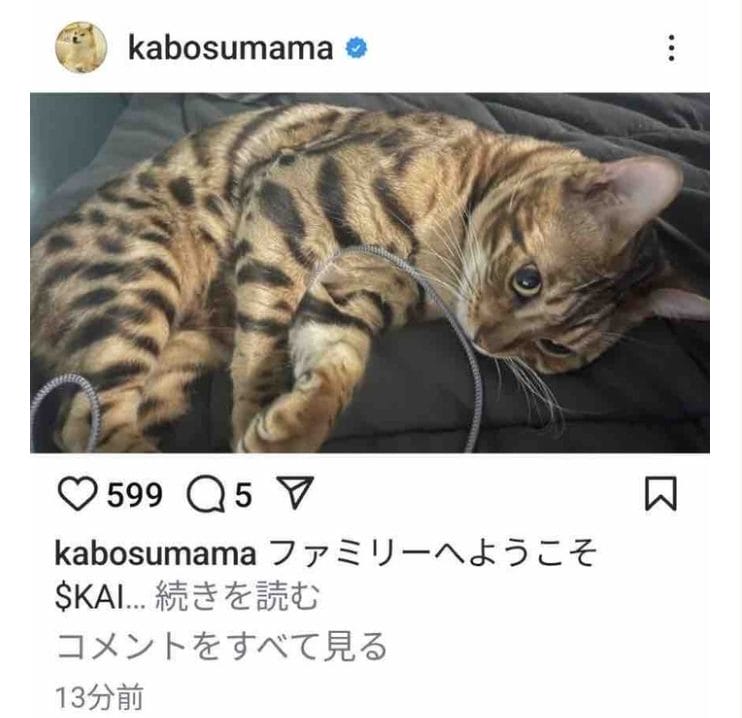Instagram of Dogecoin Mascot Kabosu Hacked to Promote Rug Pull
The scheme aimed to capitalise on the obscure rise to prominence of Dogecoin and First Neiro on Ethereum with scan coin $KAI.

The Instagram account associated with Kabosu, the iconic Shiba Inu behind the iconic Doge meme and Dogecoin mascot, has reportedly been hacked to promote fraudulent meme coins.
Atsuko Sato, the owner of the famous Shiba Inu “Kabosu-chan”, disclosed the breach on her personal blog , revealing that the account, “kabosumama,” had been under attack with several unauthorized login attempts.
Despite having two-factor authentication enabled, the account was eventually compromised.
Sato warned her followers, urging them to ignore any suspicious direct messages that might seem to come from her. She also shared screenshots of the fraudulent messages in a follow-up blog post issuing a warning:
Don’t click “Like”! Be careful of DMs! Don’t click on links! I’m really sorry for the inconvenience.
Kabosu Hacked to Front Meme Coin Rug Pull
Kabosumama’s Instagram hacker posted an image of a cat purported to be a “new family member,” dubbed “Kai.”
 Fraudulent Instagram post promoting “$KAI.” Source: Atsuko Sato.
Fraudulent Instagram post promoting “$KAI.” Source: Atsuko Sato.
The now-deleted fraudulent post was captioned with the ticker of a meme coin launched on Pump.Fun in advance, $KAI , with the description “A new family member has joined us! His name is Kai.”
The scheme cleverly mimicked Sato’s recent real-life adoption of a Shiba Inu dog, “Neiro,” which has contributed to the rise of the $850 million market cap meme coin First Neiro On Ethereum ($NEIRO).
By leveraging her platform, the hacker aimed to entice victims into investing in the fraudulent scheme seeking similar returns. However, after a sharp rise investors were left fighting unrealized losses in a rug pull plummeting the token’s value down 95%.
 KAI/SOL price chart, rug pull. Source: DexScreener.
KAI/SOL price chart, rug pull. Source: DexScreener.
The post also faked a charity initiative, providing a wallet address with the claim that all donations would go to an animal shelter.
In the cryptocurrency world, hacking verified social media accounts of celebrities to promote scam coins or fraudulent websites is a common practice. It’s crucial to stay vigilant against potential attacks .
The Problem With Pump.fun
The launchpad Pump.fun rose to prominence by substantially lowering the barriers for launching a coin. The platform has simplified the process to take just one minute instead of 60 and costs $2 rather than $2,000, according to creator Alon.
However, this reduction in entry requirements has also diminished the incentives for developers to advance their projects, leading to concerns about the quality and legitimacy of the tokens being launched.
Many in the meme coin community feel that the protocol is oversaturating the market, in turn, increasing the number of scams and rug pulls .
“It’s definitely changed the game but has made it easier for bad actors to obfuscate and incentivizes bad actors way too much,” pseudonymous trader LitBro posted on X .
In response to these issues, Pump.fun has implemented several updates aimed at safeguarding users. In May, the platform integrated the on-chain visualizer Bubblemaps to allow users to research the holders of a token’s supply.
More recently, Pump.fun has begun offering a 0.5 SOL reward to deployers of successful meme coins, an initiative intended to reduce the incidence of rug pulls.
Despite these measures, skepticism remains among users about the platform’s effectiveness in addressing the proliferation of scams.
Disclaimer: The content of this article solely reflects the author's opinion and does not represent the platform in any capacity. This article is not intended to serve as a reference for making investment decisions.
You may also like
Trump’s meme token skyrockets 70% after VIP dinner invite
A whale spent over $4 million to buy VIRTUAL, WLD, COOKIE and other tokens
CloneX NFTs Hit a Wall as Images Vanish From OpenSea

SUI Jumps 73% After Grayscale and Mastercard Boost
SUI gains 73% in a week, driven by a Grayscale Trust listing and a strategic partnership with Mastercard.SUI Skyrockets After Major Institutional MovesMastercard Partnership Fuels Adoption HopesWhat’s Next for SUI?

